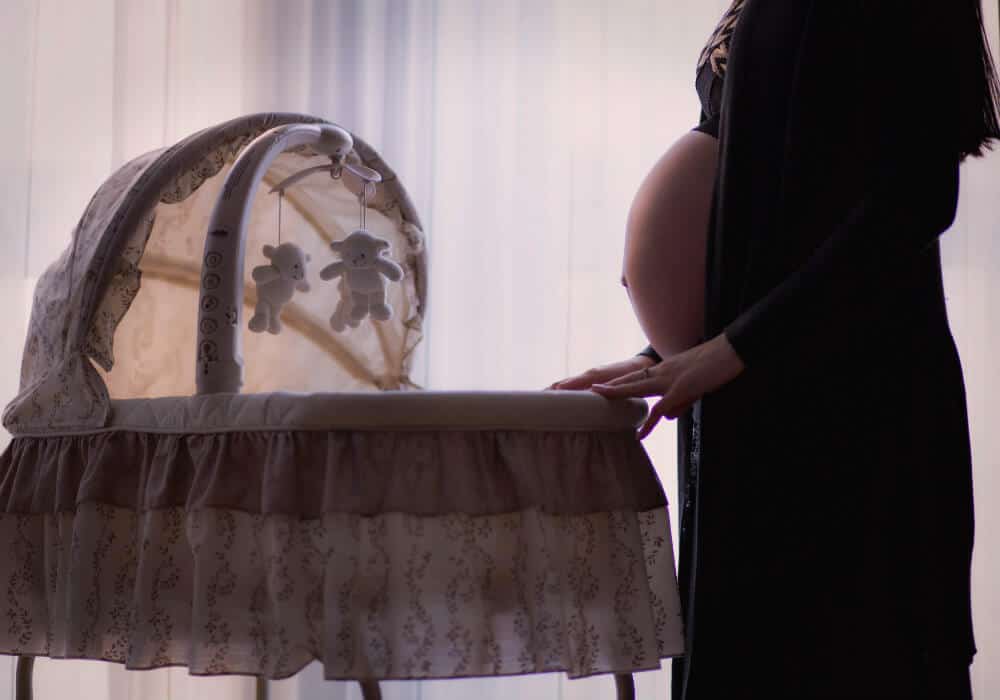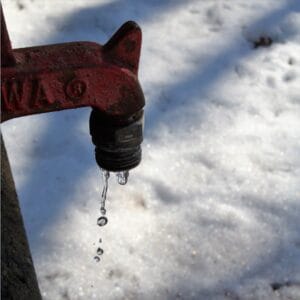Scientific studies recommend that pregnant or breastfeeding mothers can safely consume 1 to 2 teaspoons of Moringa powder daily. However, it’s crucial for them to avoid Moringa root, bark, gum, and flowers during pregnancy due to the potential risk of uterine contractions associated with these parts of the plant.
Experts recommend using Moringa powder made from the tree’s leaves.
This article explores how pregnant and breastfeeding individuals have historically used Moringa, examine current research findings, and help you determine whether incorporating Moringa leaves or powder into your diet aligns with your health goals for promoting a healthy lifestyle.
If, after this article, you want a full, in-depth guide about Moringa, you should check out this post:

Is Moringa Safe During Pregnancy?
The culinary use of Moringa leaves has a rich history dating back to times beyond recorded records. Whether ground into powders or incorporated whole into meals, Moringa leaves have been integral to human diets, transcending from India and Africa to global popularity.
This versatile plant has served as a remedy for various ailments and has become a nutritional resource so potent that doctors and aid workers in numerous countries use it to treat malnourished children and nursing mothers.
For millions of people, including pregnant or nursing mothers, Moringa leaves have been a staple in their daily diet since ancient times. Current research strongly supports this dietary choice as beneficial.
Given that nutrient deficiencies pose significant risks, especially during pregnancy, where certain deficiencies are linked to birth defects, maintaining adequate vitamin and nutrient levels is crucial for overall health. Moringa leaves and powder are rich sources of essential vitamins, minerals, and nutrients, including folate/folic acid.
Moreover, Moringa contributes to warding off high blood pressure, a potential source of complications for both the mother and unborn child. Extensive research consistently supports the safety and positive effects of consuming Moringa leaves during pregnancy, with no studies concluding any negative or harmful side effects.

Moringa Safety Tips for Pregnancy: What to Avoid
The conflicting information surrounding the use of Moringa Oleifera during pregnancy arises from the potential dangers associated with some less commonly used parts of the “Miracle tree.”
While many consume Moringa leaf powder safely, experts advise pregnant individuals to avoid the root, bark, gum, and flowers. These less common parts of the plant contain alkaloids that can be harmful in incorrect doses.

Moringa root bark, for example, contains two alkaloids that may trigger uterine contractions. These chemicals increase the risk of complications, especially in early pregnancy. Traditionally, the flowers, roots, bark, and gum of Moringa have been used as abortifacients.
Although most people don’t consume the root or bark, it’s still important to avoid them during pregnancy or breastfeeding. Reputable retailers typically don’t sell these parts, and health professionals discourage their use due to the risks. To stay safe, stick with Moringa leaf or powder for a positive experience with the “Miracle tree.”
Moringa Seeds and Pods: Safe Dosage During Pregnancy?
Researchers haven’t yet confirmed whether pregnant individuals can safely consume Moringa drumsticks or seed oil. While people have traditionally used drumsticks in cooking, these parts don’t contain the same harmful alkaloids found in the root, bark, gum, or flowers.
However, caution is advised when considering the mature seeds, as they may contain higher concentrations of certain vitamins and minerals compared to the leaves. Taking too much of certain nutrients, like Vitamin A, can pose risks during pregnancy. As of now, there is insufficient research to make a clear recommendation regarding the consumption of Moringa drumsticks during pregnancy.
To stay on the safe side, experts advise avoiding Moringa seeds during pregnancy or breastfeeding. While the seeds offer benefits like Vitamin C and cardiovascular support, it’s best to weigh those against the potential risks. Always consult a healthcare provider for personalized guidance.
Can you Take Moringa Leaves While Breastfeeding?
Yes, it is safe to consume Moringa (drumstick tree) while breastfeeding. Many consider Moringa one of the best natural remedies for boosting milk production. Moringa leaves are rich in various nutrients, including vitamins, minerals, amino acids, and antioxidants. Additionally, they contain plant sterols, which can help lower cholesterol and increase estrogen levels.
The plant sterols in Moringa also help increase estrogen, which in turn increases the production of milk. In fact, the United Nations’ Food and Agricultural Organization recommend Moringa leaves and powder to both pregnant and nursing mothers:
Leaves are rich in protein, vitamins A, B and C, and minerals – highly recommended for pregnant and nursing mothers as well as young children.
Food and Agricultural Organization of the United Nations
Several studies suggest that Moringa’s nutrient-rich profile can double milk production by up to 100%. Most experts consider it safe with minimal to no negative effects. World health organizations also recommend Moringa to nursing mothers. Therefore, based on available data, using Moringa while breastfeeding is considered safe and beneficial.
Safe Moringa Dosage for Breastfeeding
Yes, Moringa is safe for breastfeeding. While it’s known to increase lactation and is considered beneficial for breastfeeding mothers, some individuals may experience excessive lactation to the point of constant leakage. If you find that Moringa is causing an overwhelming increase in lactation, leading to difficulties such as constant leakage, it is advisable to lower your daily dose of Moringa.

Adjusting the dosage based on individual reactions is a common practice, and it’s essential to find a balance that suits your needs. The goal is to maintain a healthy level of lactation without causing inconvenience or discomfort. If you are experiencing challenges with lactation after taking Moringa, reducing the daily intake may help address the issue.
Is Moringa Safe for Pregnancy?
Pregnant people and nursing mothers have historically used Moringa leaves, and existing research suggests that, in commonly used doses, Moringa leaves are generally considered safe. However, it is crucial to consult with your doctor before incorporating any supplement into your diet during pregnancy.
Everyone reacts differently to Moringa. A doctor can give advice based on your health. Before purchasing Moringa powder or any supplement, have a discussion with your doctor to ensure that there are no specific reasons for you to avoid or limit Moringa consumption during pregnancy. Taking this precautionary step ensures a safe and informed approach to incorporating Moringa into your diet.

Taking Moringa Postpartum
Moringa dosage for pregnancy and breastfeeding also helps postpartum. It supports blood pressure and weight management. Many postpartum individuals face challenges related to weight gain and energy levels. Adding Moringa to your daily routine can boost both your energy levels and overall well-being.
One notable benefit is Moringa’s contribution to addressing iron deficiency, a common concern among new mothers. The rich nutritional content of Moringa makes it a favorable option for those seeking natural alternatives.
For mothers hesitant about traditional medicine, Moringa can be a potential choice worth considering. The positive experiences and reviews from individuals who have incorporated Moringa into their postpartum routine highlight its potential benefits.
If you decide to explore this option, we welcome your feedback and hope it contributes positively to your postpartum well-being!
Should I check With My Doctor Before Incorporating Moringa Into My Diet?
Yes, always consult with your doctor before taking Moringa or any other product during pregnancy.
Conclusion
In summary, Moringa stands out as a nutritional powerhouse with benefits ranging from diabetes management to anxiety alleviation. For pregnant or breastfeeding mothers, a daily intake of 1 to 2 teaspoons of Moringa powder is recommended, avoiding specific parts like root and bark.
While Moringa leaf powder is generally safe, individual reactions vary, emphasizing the importance of consulting with a doctor before use. Postpartum, Moringa offers potential benefits for weight management and energy levels. Always seek professional advice before incorporating Moringa into your diet during pregnancy or postpartum.
FAQs: Moringa Dosage for Pregnancy and Breastfeeding
Can Moringa Decrease Milk Supply
No, Moringa in fact does the complete opposite. Moringa is known to increase lactation and some individuals may experience excessive lactation. If this happens, it’s recommended to lower your daily dose of Moringa.
Moringa Oleifera Dosage for Lactation
Breastfeeding mothers can safely consume 1 to 2 teaspoons of Moringa powder daily. You can also consume Moringa powder as capsules for ease of consumption.

For years now, Moringa has been a daily consumption in my life, incorporated in various forms such as capsules, food recipes, and soothing teas. Initially, my daughter and I embarked on this journey as an experiment, but as time went on, I delved deeper into its remarkable potential and unearthed the unlimited benefits it offers for our well-being and health. I got motivated by how much it positively impacted me and decided to share my insights about Moringa’s profound impact on health and overall living through my blog posts.
